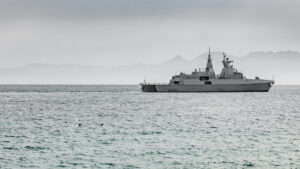If you find scenarios like the one I discuss in the video below interesting, I discuss how changes in the global order impact several industries from insurance to manufacturing to finance to agriculture and energy and beyond in my new book, The End of the World is Just the Beginning, available everywhere–including your local bookstore.
At the onset of Russia’s invasion of Ukraine, Europe, NATO and much of the industrialized world moved quickly to isolate Moscow economically. As part of those moves, Russia saw its seaborne oil export volumes fall off precipitously–to the tune of 1 million barrels a day. Volumes that large threatened to shut in several of Russia’s oilfields.
Even as a collection of private interests moved against Russian seaborne shipments–crews, ports, captains, ship owners–it has taken European governments longer to formalize a sanctions package that denied ships carrying Russian cargoes access to the global insurance market.
While some of you might think that shipping insurance is decidedly unsexy, it forms a bedrock of modern seaborne transport. You need insurance to enter and exit ports, to transit the Suez and Panama canals, to go through high-risk areas like Malacca and Hormuz and the Bab al-Mandeb. Without it, you risk holding the bag if any problems occur. (Imagine if your tanker gets wedged sideways in the Suez Canal. Or you’re stuck on either side of said ship. Or you run aground accidentally. Etc.)
Europe and the United States account for roughly 95% of the private insurance market. Outside of that, the only realistic option is sovereign indemnification of ships–having independent states insure cargoes. India and China have gone this route, eager to gobble up Russian crude with a $30+/barrel discount. Through some inventive accounting, ship registries, ship-to-ship transfers and more, Russian crude has steadily crept back to more-or-less pre-invasion levels.
Enter American and European sanctions. The ad hoc group of shippers, crews and port workers denying Russian goods access to European sea lanes has more or less been formalized, with a global impact. As the international sanctions regime intensifies, India and China might do well to revisit their stance on importing Russian crude and decide to voluntarily reduce imports–similar to their approach at the outset of Moscow’s invasion of Ukraine.
Here at Zeihan On Geopolitics we select a single charity to sponsor. We have two criteria:
First, we look across the world and use our skill sets to identify where the needs are most acute. Second, we look for an institution with preexisting networks for both materials gathering and aid distribution. That way we know every cent of our donation is not simply going directly to where help is needed most, but our donations serve as a force multiplier for a system already in existence. Then we give what we can.
Today, our chosen charity is a group called Medshare, which provides emergency medical services to communities in need, with a very heavy emphasis on locations facing acute crises. Medshare operates right in the thick of it. Until future notice, every cent we earn from every book we sell in every format through every retailer is going to Medshare’s Ukraine fund.
And then there’s you.
Our newsletters and videologues are not only free, they will always be free. We also will never share your contact information with anyone. All we ask is that if you find one of our releases in any way useful, that you make a donation to Medshare. Over one third of Ukraine’s pre-war population has either been forced from their homes, kidnapped and shipped to Russia, or is trying to survive in occupied lands. This is our way to help who we can. Please, join us.








